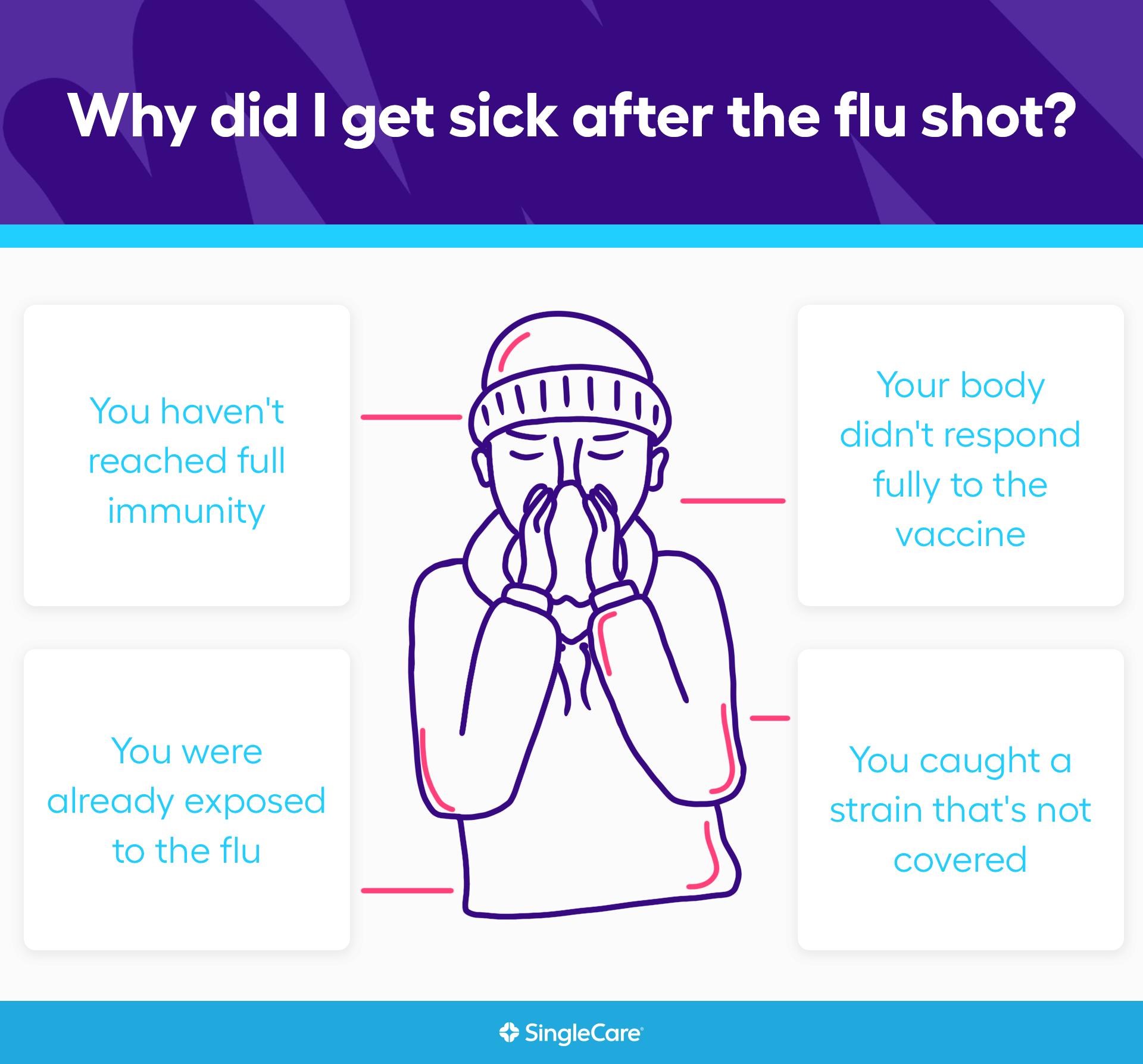Key takeaways
The flu shot cannot cause the flu, as it does not contain a functional influenza virus, but mild side effects are common and indicate an immune response.
It’s possible to get sick after receiving the flu shot due to exposure to the virus before immunity has developed or due to mismatches between the vaccine and circulating strains.
Certain groups, including those with severe egg allergies or certain medical conditions, should consult with healthcare providers for the most suitable flu vaccine option.
The CDC recommends the flu shot for most people over 6 months old, emphasizing its importance during the COVID-19 pandemic to prevent overwhelming healthcare systems and reduce flu risks.
As the warm summer days begin to fade and the air starts to turn crisp, myths surrounding the flu vaccine begin to circulate—seemingly as contagious as the flu virus itself. “The most common things we hear are related to concerns of getting the flu from the flu shot and patients telling us that they are very healthy and never get the flu,” says Inessa Gendlina, MD, Ph.D., an assistant professor of infectious diseases at Montefiore Health System.
Other myths include not needing to be vaccinated every year to maintain immunization, the flu vaccine not being very effective, and the flu not being very dangerous. With all these misconceptions swirling about, fewer than half of adults in the United States get vaccinated annually, even though an estimated 359,000 Americans died from the flu between 2010 and 2020.
Although it’s common to experience some mild side effects from the flu vaccine, serious reactions are very rare, and getting the flu from the vaccine isn’t possible. Here’s how to know what to expect.
Can you get the flu from the flu shot?
While mild symptoms such as a low-grade fever, headache, and muscle pains are common following an immunization, this isn’t actually the same as getting sick or getting the flu. “Flu vaccine does not contain functional influenza virus, and injectable flu shots do not contain any live virus,” says Dr. Gendlina.
Instead, what’s happening when you experience these symptoms is the body is mounting an immune system response to the flu vaccine as it learns how to fight the real virus. When someone experiences mild symptoms after a flu shot, it indicates that the immune system is responding to the vaccine. “Just like it cannot give you the flu, it also does not make you sick. The vaccine will produce an immune response that can make you feel run down, but it is not the flu and nowhere near as bad as the flu,” Dr. Wexler clarifies.

Is it common to feel sick after a flu shot?
Some people experience very mild flu-like symptoms such as low-grade fever, fatigue, muscle aches, nasal congestion, runny nose, sore throat, cough, and feeling generally run down. These flu shot reactions are common and expected, according to Dr. Gendlina.
While the flu shot itself varies year to year, the common side effects remain relatively similar, perhaps with individual symptoms such as body aches peaking more in one year versus another. Occasionally, fainting is reported following a flu shot. (This is why it’s better to sit down while receiving your vaccine, and to be observed for 15 minutes afterward.)
Finally, it’s possible that some people experience vaccine side effects as a result of the nocebo effect, which occurs when an adverse event happens as a result of negative expectations regarding a treatment or medication. Research has indicated that being told that you may experience a side effect can cause you to experience that effect, even if you’re provided a placebo treatment.
RELATED: What are the most common flu shot side effects?
You may still get sick, even if you’re vaccinated
It takes two weeks to build full immunity after receiving your flu shot. If you get sick shortly after receiving the vaccine, you were already infected with the virus before your body created a defense against it. It wasn’t the flu shot that caused your sickness, just unlucky timing.
Additionally, vaccine effectiveness varies from year to year. “Vaccines are based on a prediction of what influenza virus types are expected to be circulating this year, and if that prediction is not completely accurate, the vaccine may be less protective than expected,” says Gendlina.
It’s also possible that your body didn’t mount a full immune response if you’re immunocompromised, pregnant, or age 65 years or older. Those medical conditions can leave you more vulnerable to infection even if you are immunized. If you’re vaccinated, the immune system will still act to help fight the infection if you do get the flu, likely resulting in a more mild course of the flu illness than if you had not been vaccinated.
RELATED: What groups are at a high risk for flu complications?
Who should skip the flu shot?
While the flu vaccine is widely recommended for anyone aged 6 months or older, there are a few demographics who should take special consideration, says Dr. Wexler. There are also certain populations who may be better suited for one type of vaccine over another, so it’s important to seek medical advice regarding the best option for you. The most common considerations are:
- Age: Children younger than 6 months of age should not get a flu vaccine. (When the mother gets vaccinated during pregnancy, it helps protect the baby during the first few months. A mother’s breast milk can also help protect the baby against the flu because it contains antibodies.) Additionally, those under the age of 18 should not receive the recombinant influenza vaccine, and the adjuvanted and high-dose inactivated vaccines are only approved for older adults aged 65 years or older.
- Severe egg allergy: Most flu vaccines are manufactured in egg-based culture and may contain some residual egg protein, says Dr. Gendlina. Those who are able to eat lightly cooked eggs or eggs in baked goods are not likely to have a reaction to the flu shot. People with severe anaphylactic reactions to eggs should receive their flu vaccine in a supervised medical setting or speak with their physician regarding an egg-free formulation of the flu vaccine such as Flublok.
- Other allergies: Those who have life-threatening allergies to any ingredient in the vaccine such as gelatin, antibiotics, or other ingredients should avoid the flu shot.
- Flu symptoms: Patients who are experiencing symptoms of the flu or who feel sick should discuss symptoms with their healthcare provider.
- Guillain-Barré syndrome: Those who have previously had Guillain-Barré syndrome (GBS) should discuss whether or not they should get the flu shot with their doctor.
- Previous reactions: People who had a severe allergic reaction to flu shots in the past should likely avoid future flu vaccines.
The nasal spray flu vaccine carries separate restrictions for who should not receive this version of the vaccine. If you experience any of the below health conditions or fall into any of these categories, speak with your doctor about receiving a different form of the vaccine:
- Those younger than 2 years, or 50 years or older
- Young children who have asthma or a history of wheezing
- Children ages 2 years through 17 years who are taking medications that contain aspirin or salicylates
- Pregnant women
- People who are immunocompromised or live with or care for an immunocompromised person
The bottom line
The flu is a serious illness that can result in sinus infections, pneumonia, hospitalization, or even death, but the vaccine can reduce the risk of flu by up to 60%. As such, the CDC recommends most people older than 6 months—including pregnant women—get a flu shot. It takes about two weeks for the body to build its immunity from the seasonal flu, so consider getting your shot sooner than later, as the body is still vulnerable to getting sick while it’s building immunity.
Additionally, while the seasonal flu vaccine doesn’t protect against COVID-19, the presence of a pandemic makes getting a flu vaccine all the more important for a few reasons. Contracting influenza could cause patients to be less able to fight off a case of COVID-19, and contracting both at the same time could be very dangerous. Further, hospitals already dealing with coronavirus cases may be overwhelmed by even a mild flu season. For the best protection against the flu and COVID-19, you should get your yearly dose of flu vaccine as well as a COVID-19 vaccine.
If you have questions regarding the flu shot, talk to your healthcare provider or pharmacist.



